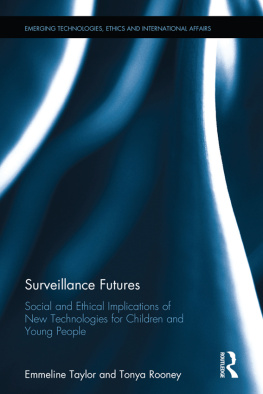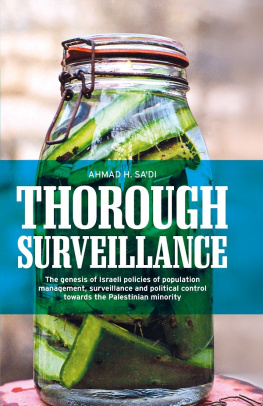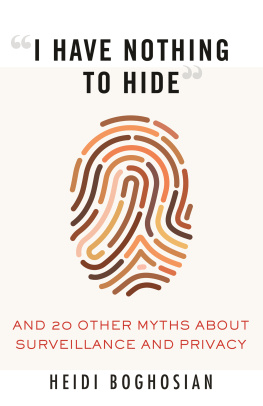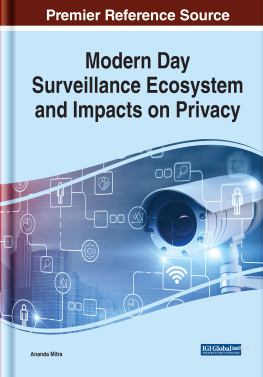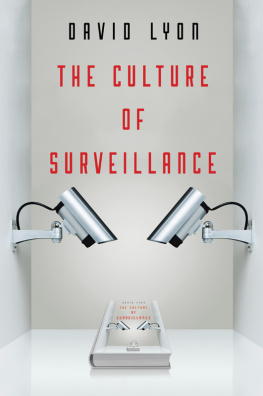Under Surveillance
Being Watched in Modern America
RANDOLPH LEWIS

University of Texas Press
AUSTIN
Copyright 2017 by the University of Texas Press
All rights reserved
First edition, 2017
Requests for permission to reproduce material from this work should be sent to:
Permissions
University of Texas Press
P.O. Box 7819
Austin, TX 78713-7819
utpress.utexas.edu/rp-form
LIBRARY OF CONGRESS CATALOGING-IN-PUBLICATION DATA
Names: Lewis, Randolph, author.
Title: Under surveillance : being watched in modern America / Randolph Lewis.
Description: First edition. | Austin : University of Texas Press, 2017. | Includes bibliographical references and index.
Identifiers: LCCN 2017003541
ISBN 978-1-4773-1243-8 (cloth : alk. paper)
ISBN 978-1-4773-1380-0 (library e-book)
ISBN 978-1-4773-1381-7 (non-library e-book)
Subjects: LCSH: Electronic surveillanceSocial aspectsUnited States. | Social controlUnited States. | Privacy, Right ofUnited States.
Classification: LCC TK7882.E2 L49 2017 | DDC 363.1/063dc23
LC record available at https://lccn.loc.gov/2017003541
doi:10.7560/312438
Contents
Introduction
A grateful parent listens to a sleeping newborn through a baby monitor. An excited teenager uses an app to locate her friends at the mall for some holiday shopping. A worried family relies on a security camera to safeguard an elderly relative in a nursing home three states away. A hip young couple, ever so ironic, giggles at the private lives of the rich, famous, and decadent who have been caught on a paparazzos camera. A shy second-grader boards a bus, looks into an iris scanner, and receives instant confirmation that hes in the right place.
This is surveillanceand it doesnt sound so bad.
But then imagine something else: A hotel maid continues to go full tilt near the end of her shift, even when her feet start aching, because shes being electronically monitored for maximum sheet-changing efficiency.
This is surveillance, too, and at times its enough to make someone put on a tinfoil hat and hide underneath the sofa. CCTV cameras, Transportation Security Administration (TSA) scanners, National Security Agency (NSA) databases, Big Data marketers, Predator drones, stop-and-frisk police tactics, Facebook algorithms, hidden spyware, workplace monitors, and even old-fashioned nosy neighbors armed with the latest in monitoring technologyBig Brother now has many different faces, some designed to intimidate, others designed to entice our cheerful participation. Although surveillance has a long history that precedes its latest high-tech incarnation, it has a new prominence in our world today, so much so that one scholar, Kevin Haggerty, has called it the dominant organizing practice of late modernity. Like many other scholars who write in the emerging field of Surveillance Studies, Haggerty suggests that we are in the midst of a world-historical transformation in terms of the emergence of new practices, dynamics, and technologies of surveillance.
Never before has so much been known about so many. As the sociologist William G. Staples wrote in 2000, We seem Almost two decades later, we are much closer to that unprecedented state of permanent visibility in which our secretswhat we say, what we buy, what we wantare constantly laid bare to various monitoring systems with very long memories. The vast infrastructure of surveillance is still an imperfect system with disparate parts working for disparate purposes, but these distinct state, corporate, and personal systems are likely to become increasingly interwoven in the near future. Yet even as I write in 2017, the first year of Donald Trumps administration, the capabilities of state, corporate, and peer surveillance are enough to give most anyone pause.
Some representative examples should give you a sense of what I mean: the NSA scoops up almost every electronic utterance and stores it in a vault built to hold thousands of yottabytes in the Utah desert. Customs and Border Protection flies Predator drones over the United States that are identical to the ones in Afghanistan, minus the missiles. Across the pond, in a program with the fiendish code name Optic Nerve, the British intelligence service known as MI6 collected millions of images from Yahoo! Chat, including naked selfies, from people who were never suspects in any investigation.
The situation is not that different back home in the United States, where law enforcement is investing in sophisticated surveillance tools once reserved for soldiers and spies. While
If it sounds like government agencies are driving the spread of surveillance technologies and techniques in contemporary America, its important to remember that the private sector is an equal partner in this lucrative business. In addition to working with government agencies to create backdoors into our private communications, corporate America sells the drones, cameras, sensors, computers, and expertise needed to run a surveillance-obsessed society. While one US bank experiments with retina scans for ATM identification, another uses biometric voice-printing during customer service calls to confirm a customers identity, though it didnt bother to let anyone know.
Not surprisingly, some of the biggest companies of the twenty-first century are getting rich off monitoring and sharing vast quantities of personal data that we happily (and perhaps not-so-happily) divulge in the name of community, connection, and convenience. Sorry, gay Braziliansno friends for you in Gods Panopticon!
Yet Facebook and other social media are offering something that many people want: the ability to keep close tabs Clearly, its not just the government watching where we are, what we are saying, what we are buying, and who we are with. Increasingly, we are exposed to one anotherfriends, family, strangersin ways that we have only begun to understand.
None of this should come as a shock if youve been following the news in the years since Edward Snowdens extraordinary leaks and related stories that seem to arrive with mind-numbing frequencyor if youve been watching television shows like Black Mirror, the popular British series that imagines the strange outcomes of existing technologies in the not-so-distant future. But what does it all mean? What will it feel like to live in a society making unprecedented investments in surveillance? Are we enhancing human happiness or undermining it? Will we be able to preserve pockets of dignity, autonomy, and privacy in a world of ubiquitous monitoring? Im cautiously optimistic that we can learn to use surveillance technologies in a more thoughtful manner; that we can make better decisions about our personal privacy and home security; and that we can make wiser choices for investing our limited emotional and financial resources as individuals and as a countrybut only if we start to ask difficult questions about the weirdness and weariness of living under the blanket of surveillance technology in the years ahead.
One can offer, at best, only a partial report on a sprawling phenomenon such as surveillance in contemporary society. The part that I have chosen to report on is not what interests most politicians or the mainstream media outlets, most of which prefer stories about looming threats that require new security measures, new fortifications, new secret archives. Almost nothing in the mainstream conversation about surveillance touches upon the thing that interests me: the soft tissue damage that it inflicts. What I mean by this is the sustained and often subtle impact of surveillance, its unintended consequences, and the intimate ways that it changes how we think and feel about the world. That is why this is not a book about Edward Snowdens revelations, nor the inner workings of the NSA, FBI, or Google, nor the constant peer scrutiny that drives our online lives on Snapchat, Instagram, Facebook, and similar apps. Instead, Im chasing something far more slippery but no less consequential: the ethical, aesthetic, and emotional undercurrents that course through a high-tech surveillance society. What are the implications of living with these rapidly proliferating surveillance technologies and practices? What are the hidden costs of living in a society in which surveillance is deemed essential to governance, business, and ordinary social life? What are the emotional burdens and benefits of living in a surveillance-obsessed culture? And ultimately, what is driving the vast market for surveillance on an emotional and ideological level in ways that often transcend logic and reason? These are the central questions in a book that weighs some of the subtle impacts of surveillance in the United States.
Next page


